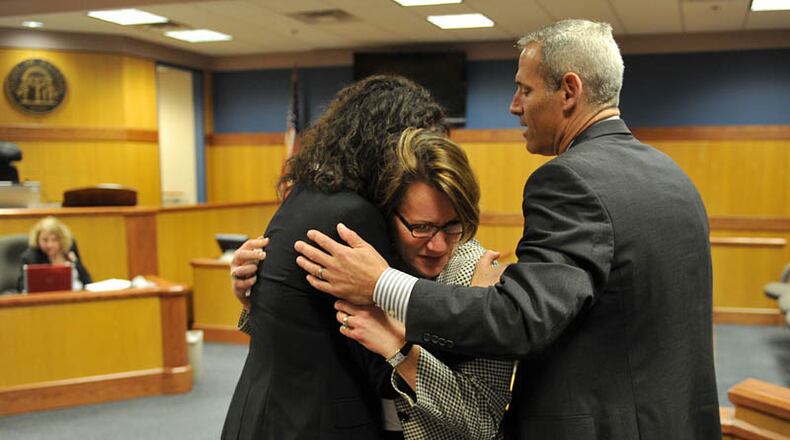Stacey Kalberman was unfairly forced from office as retribution for investigating Gov. Nathan Deal’s 2010 campaign, a Fulton County jury ruled Friday.
The jury, after deliberating 2 1/2 hours ordered the state to pay the former ethics commission director $700,000.
Jurors began deliberations midday Friday.
Lawyers for Kalberman and for the commission spent much of the morning on closing statements, urging jurors to remember their key arguments and to discount the other side.
Kalberman sued her former employer, claiming she and her former top deputy, Sherilyn Streicker, were forced from their jobs. Jurors heard three days of testimony from current and former commissioners and employees, culminating Thursday night with several hours of testimony from Kalberman herself.
Kalberman’s attorneys worked all week to show that the commission’s decision in June 2011 to cut her salary by $35,000 and to eliminate Streicker’s job were a response to the pair’s desire to issue subpoenas for records in the investigation.
Attorneys for the commission, meanwhile, tried to establish that the agency’s budget was in crisis and that was what motivated the cuts.
Kalberman attorney Kim Worth told jurors that the commission’s defense in the case was full of inconsistencies and contradictions. Defense witnesses, Worth said, testified that they recruited Holly Laberge to replace Kalberman while Kalberman was still in her job and before they announced plans to cut her salary and eliminate Streicker’s job.
Worth said even former commission Chairman Patrick Millsaps, who engineered the plan to cut Kalberman’s salary, testified that the recruitment of Laberge by Deal’s office “doesn’t pass the smell test.”
“That, ladies and gentlemen, is pretext,” Worth said. “The very first witness. It doesn’t add up.”
Assistant Attorney General Bryan Webb, meanwhile, hammered at Kalberman in his closing statement. He said during the key May 3, 2011, meeting, before Kalberman and Streicker presented the commission draft subpoenas for records in the Deal investigation, Kalberman acknowledged the agency had major budget problems.
Then “she went into executive session and asked for a raise,” Webb said. “She had the gall to say the sky is falling, we’re going to run out of money and you know what? I want $5,000 more for myself.”
That was what led to the decision to reduce her salary, Webb said, not the Deal investigation.
“Kalberman took actions that made commissioners begin to question her abilities,” he said.
Worth acknowledged that the budget wasn’t perfect but said it was no surprise.
“Budgets are always a problem in state agencies,” Worth said. “They’re always an issue.”
In fact, Worth said, almost immediately after taking the job, Laberge hired a staff attorney and a receptionist. Laberge testified that when she took over she found no budget crisis.
“The reason they made the personnel decisions they did was because they wanted to take the attorneys out,” Worth said. “They wanted to remove the attorneys from the commission.”
About the Author
Keep Reading
The Latest
Featured



